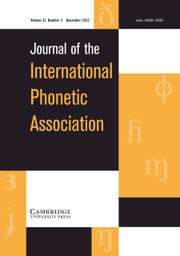Article contents
Quality of back vowels before /r/ in the American Inland North
Published online by Cambridge University Press: 04 December 2007
Abstract
Three American English diphthongs involving onsets in the back of the vowel space were investigated by means of acoustic measurements, discriminant analysis, and perceptual experiments. These diphthongs, termed DOOR/WAR, TOY, and STAR, were observed in the speech of ten young women residing in southern Michigan. The diphthongs were elicited in a variety of /b/-, /ɡ/-, and /h/-initial words (e.g. board, Boyd, and barred). Words with similar consonantal margins but different nuclei (e.g. bode, baud, and bod) were elicited, as well. The DOOR/WAR and TOY words were compared with bode and baud (and similar words with initial /ɡ/ and /h/), while the STAR words were compared with baud and bod (and similar words with initial /ɡ/ and /h/). All three methods of investigation showed that the initial part of the DOOR/WAR and TOY diphthongs more closely resembles that of bode than baud. On the other hand, the initial part of the STAR diphthong was shown to be intermediate between that of baud and that of bod.
- Type
- Research Article
- Information
- Journal of the International Phonetic Association , Volume 37 , Issue 3 , December 2007 , pp. 275 - 291
- Copyright
- Copyright © Journal of the International Phonetic Association 2007
References
- 1
- Cited by


